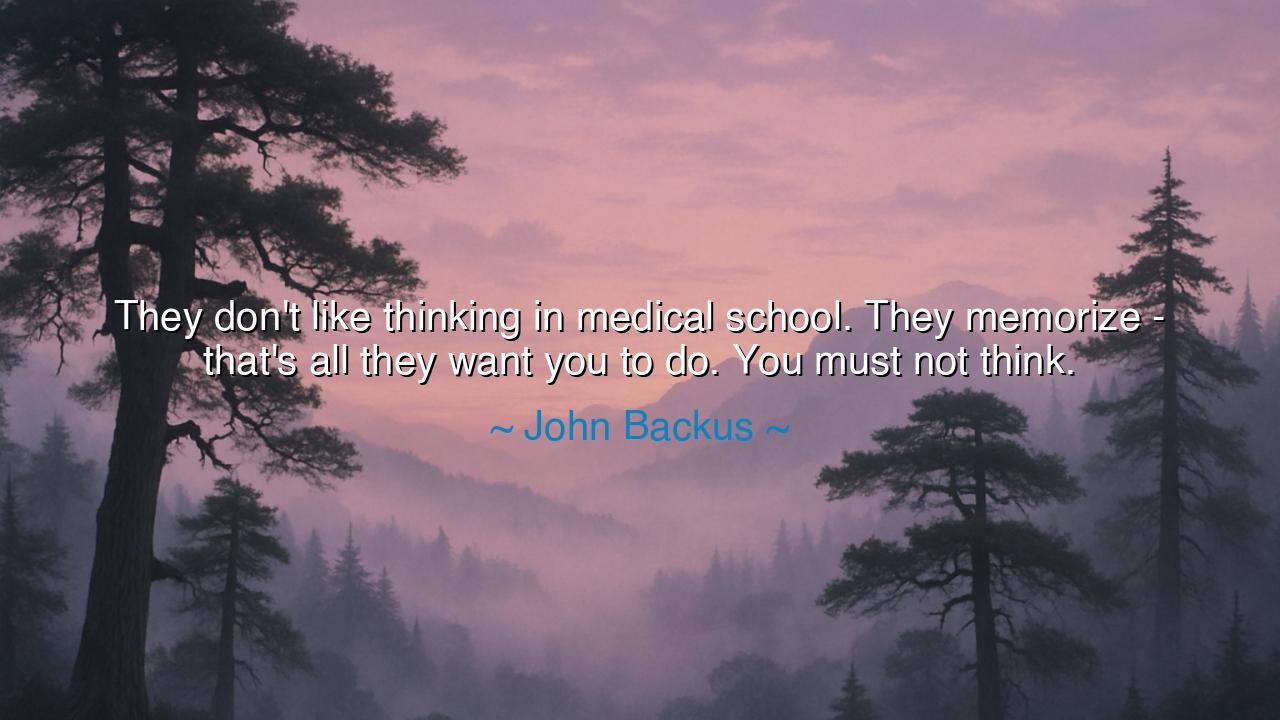
They don't like thinking in medical school. They memorize -
They don't like thinking in medical school. They memorize - that's all they want you to do. You must not think.






Hearken, O seekers of wisdom and disciples of the healing arts, to the words of John Backus, who lamented: "They don't like thinking in medical school. They memorize—that's all they want you to do. You must not think." Within these words lies a profound reflection on the tension between knowledge and understanding, between rote obedience and the spark of true intellect. Backus calls our attention to the danger of training that values repetition over reason, memory over insight, and the peril of cultivating practitioners who act without reflection.
Since the dawn of medicine, sages have known that healing is not merely the application of learned facts, but the exercise of judgment, reasoning, and discernment. Hippocrates, the father of medicine, did not instruct his students only to memorize herbs or remedies; he urged them to observe, to question, to think for themselves. Backus’s critique is timeless: an education that suppresses thought creates physicians who follow instructions, yet may falter in the face of novelty, complexity, or ethical ambiguity.
Consider the tale of Ignaz Semmelweis, the Hungarian physician in the 19th century who discovered the life-saving importance of handwashing. Had Semmelweis relied solely on the memorized teachings of his predecessors, he would have remained blind to the invisible scourge killing mothers in his wards. Only by thinking critically, questioning authority, and observing closely did he arrive at his revolutionary insight. Here lies the peril that Backus warns of: when medical education discourages thinking, innovation is stifled, and countless lives may be lost.
Backus’s words also echo in the halls of philosophy. The ancient academies of Greece prized dialectic over memorization. Students were trained to engage, to challenge, to reason, for knowledge without thought is a body without a soul. Similarly, in the practice of medicine, the mind must remain agile, able to synthesize observations, evaluate uncertainty, and act with wisdom. Memorization alone is a tool, but thinking transforms that tool into a weapon against disease and suffering.
This observation extends beyond medicine. In every field, from law to engineering, rote learning produces technicians, but thought produces innovators, leaders, and healers. The capacity to think critically distinguishes the ordinary from the exceptional. Backus challenges us to cultivate minds that interrogate, analyze, and create, even within rigid systems that reward repetition and conformity.
The lesson is profound: memorization is insufficient without thought. True mastery arises when knowledge is combined with inquiry, observation, and reason. Students and practitioners must resist the temptation to surrender entirely to rote instruction, for the soul of their profession demands discernment, intuition, and judgment as well as facts.
Practical action flows from this wisdom: engage actively with learning, question assumptions, seek to understand principles rather than only rules, and practice applying knowledge in varied and challenging contexts. Do not allow memorization to replace reflection. Observe closely, think boldly, and cultivate the courage to reason where others merely recite.
O seeker of understanding, remember this: the value of knowledge is not in its storage but in its application, guided by the light of thought. Let the words of John Backus stir your mind, reminding you that to heal, to innovate, and to excel, one must not only remember, but think deeply, critically, and courageously. In this, the true healer is forged, equipped to confront the unknown with wisdom and insight.
I can also create a narrative, oral-style version, with rises, pauses, and emphasis to make it feel like an ancient teaching delivered aloud. Do you want me to do that?






AAdministratorAdministrator
Welcome, honored guests. Please leave a comment, we will respond soon